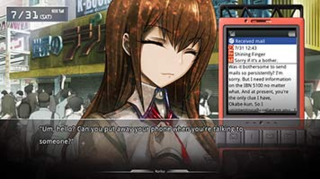Overview
Steins;Gate is the second game in the Science Adventure series of visual novels written by Naotaka Hayashi, sharing the same multiverse as Chaos;Head and later Robotics;Notes. The title was co-developed between 5pb. and Nitroplus and was initially released for the Xbox 360 in Japan on October 15, 2009. Ports were later made for a number of different platforms and the game's success led to the creation of several spin-off titles as well as adaptations into other related media, which established Steins;Gate as it's own franchise outside the Science Adventure series. A remake of Steins;Gate was released 10 years later called Steins;Gate Elite that replaced its static artwork with animated footage re-purposed from the game's anime adaptation.
English Release
A group of fans began the "Steins;Gate Visual Novel Translation Project" in June 2011 which looked to create an unofficial English translation patch for the PC port of Steins;Gate. Soon after, a rough incomplete draft of the team's translation was released to the public in September 2011. The project, however, was eventually cancelled in January 2012 when the team revealed that they were in talks with JAST USA to work on an official North American release of the game. A year later, JAST USA did announce that Steins;Gate would be released in English for the PC at Anime Expo 2013. JAST's English script used the fan group's translation as the basis for their localization which was further polished by members of the fan translation team that were commissioned for the project.
JAST USA published three different releases of Steins;Gate with a limited edition and a download version released on March 31, 2014 and a regular physical release published on April 30, 2014. Later in 2015 the UK based publisher pQube released the PlayStation 3 and Vita ports of Steins;Gate in Britain as well as in the United States. Once again in 2016, 5pb themselves released Steins;Gate on Steam, which featured a new HD 1080p resolution. Some time later, after Spike Chunsoft formed a partnership with 5pb in 2017, the publishing rights for the Steam edition of Stein;Gate were transferred to Spike Chunsoft's US division on September 11, 2017.
Story
 Akihabara
Akihabara The game is set in Akihabara, Tokyo, during the summer of 2010 and follows a group of friends who have modified a microwave to send mobile text messages back in time. The inventor, Rintaro Okabe, is a self-proclaimed "mad scientist" who believes that the international scientific organization SERN (based on CERN) is conducting their own time travel experiments and conspiring to reshape the world according to its own interests.
The discovery and experimentation of this instrument become the catalyst of fundamental alterations to the present. Okabe is the only one aware of these changes because he possesses "Reading Steiner," the ability to retain the memories from previous experienced timelines. Oblivious to the consequences of their actions, Rintaro and his friends end up creating modifications of grievous proportions.
This eventually causes SERN to take notice, placing the lives of his fellow lab members in danger. Rintaro Okabe must use his time-altering capabilities in order to escape SERN's attention while keeping his friends away from harm.
Gameplay
 Answering calls can also affect conversations you are having in-person.
Answering calls can also affect conversations you are having in-person.Similar to other visual novels, Steins;Gate consists mainly of reading text with the player only directly interacting with the game through choices that impact the branching narrative. However, these choices are not made through the usual menu prompts, but are instead made using the player's cell phone. "Phone Triggers" will appear at certain points throughout the story where the player can choose to answer a call or reply to emails. Depending on when the player answers the phone and how they respond to messages will cause the narrative to branch towards a number of different alternate timelines and possible endings.
Characters
- Rintaro Okabe: The main character. Okabe is a first year college student who thinks of himself as a mad scientist and uses the alias "Hououin Kyouma." Voiced by: Mamoru Miyano.
- Kurisu Makise: A skilled neuroscientist who had her research published in an academic journal when she was only 18 years old. Called Christina, among other nicknames, by Okabe. Voiced by: Asami Imai.
- Mayuri Shiina: Okabe's childhood friend that works at a maid café called May Queen Nyan-nyan and enjoys making cosplay costumes. Her nickname is Mayushii. Voiced by: Kana Hanazawa.
- Suzuha Amane: A girl searching for her father who works as a part-timer for Okabe's landlord. She seems to have a some sort of grudge against Kurisu. Voiced by: Yukari Tamura.
- Luka Urushibara: An effeminate boy that work at his family's shrine as a shrine maiden. He is Okabe's so-called protégé and is often asked by Mayuri to try on her cosplay costumes. Voiced by: Yu Kobayashi.
- Faris Nyannyan: The most popular girl at the May Queen Nyan-nyan maid café who's real name is Akiha Rumiho. Voiced by: Haruko Momoi.
- Moeka Kiryu: A tall quite woman that almost exclusively communicates to others via text messages. She is nicknamed "Shining Finger" by Okabe due to her speed texting. Voiced by: Saori Gotō.
Adaptations
Since Stein;Gates' release the game has been adapted into a variety of other media, including manga, novels and even an audio drama. A Steins;Gate anime was also created in 2011 by White Fox and was 24 episodes in length. The show was simulcasted in English on Crunchyroll and was later licensed and released by Funimation Entertainment on DVD and Blu-Ray in 2012. A movie titled Steins;Gate: The Movie - Load Region of Déjà Vu was produced in 2013 that expanded upon the ending of the television series, which was later licensed by Funimation in 2014 and eventually released in 2017.
Reception
Steins;Gate and its anime adaptation have both been highly acclaimed.
The visual novel received critical praise from various Japanese game reviewers, including 4Gamer, ITmedia Gamez, and particularly Famitsu which gave Steins;Gate the "Game of Excellence" award. In 2011 Steins;Gate was voted #6 in Famitsu's poll of "Most Tear-Inducing Games" of all time. Square Enix producer Tomoya Asano praised the game's characters and scenario, which led to Steins;Gate writer Naotaka Hayashi being recruited to pen the plot to Bravely Default: Flying Fairy.
The anime adaptation of Steins;Gate has also been well received. Anime News Network gave the series an overall A- rating, with top marks awarded to its story, and the show is the highest user-rated anime on the site. The Digital Fix gave the English DVD release a score of 8 out of 10, with a 9 out of 10 for the show itself. Doctor Who TV gave the anime adaptation a score of 25 out of 30, making it the site's highest-rated time-travel fiction, above the films Terminator, Back to the Future, and Groundhog Day, the anime Future Diary, the shows Quantum Leap and Heroes, the game Shadow of Memories, and the novel Time Machine.
The 2014 English release of the Steins;Gate visual novel was also well-received. It currently holds aggregate review scores of 86% and 87/100 on GameRankings and Metacritic, respectively. On Metacritic, it is currently the sixth highest-rated PC game of 2014, and the third highest user-rated PC game of 2014 so far. It received a perfect 5/5 score from Twinfinite, concluding that it had "excellent characters," a "well-written narrative," "good time-travel," "perfect voice-acting," and a "unique and beautiful art style." But the game's length was criticized for being "very long."
Log in to comment